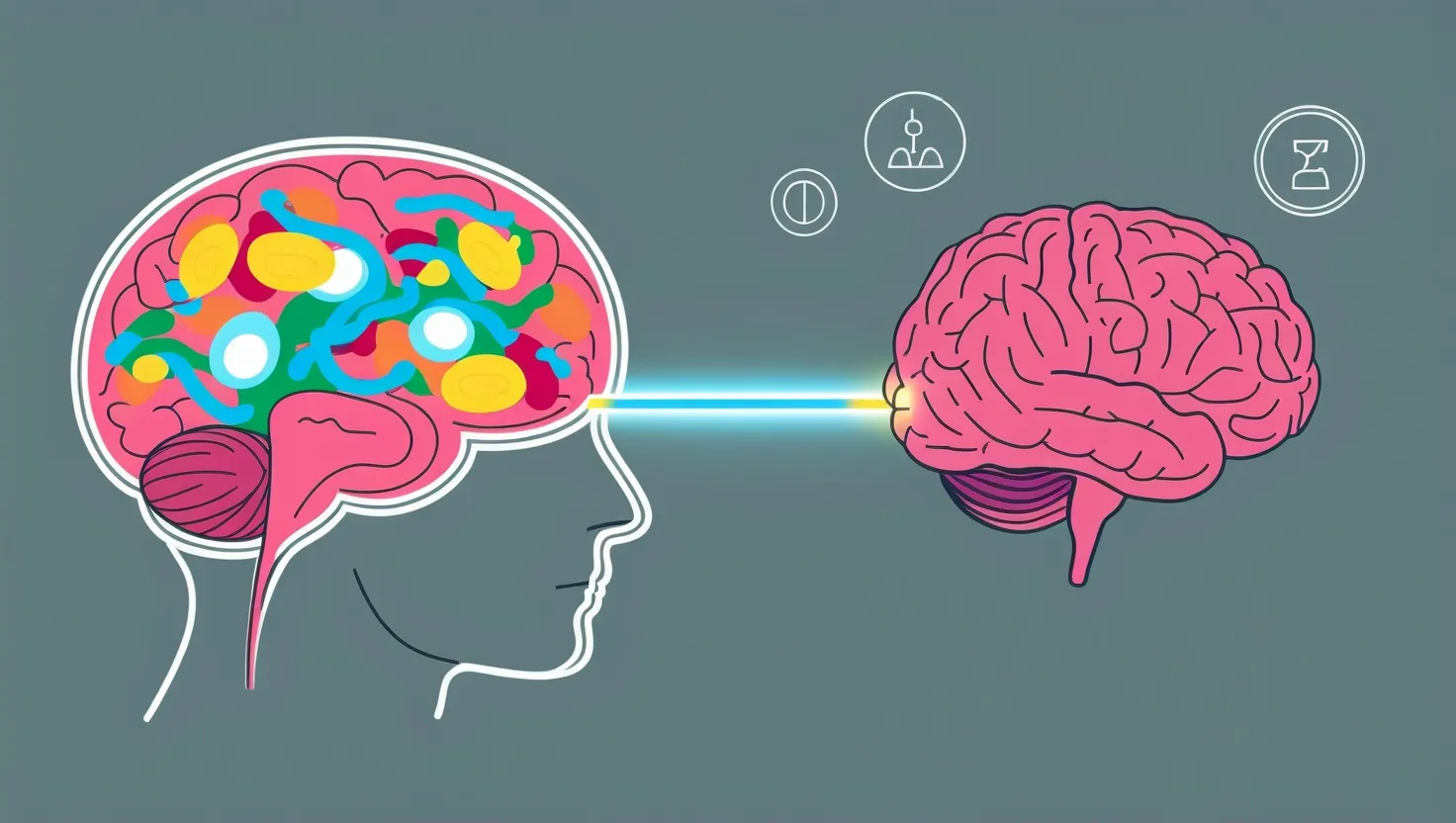Imagine a world where your gut bacteria are not just passive inhabitants of your digestive system, but active allies in boosting your brainpower and productivity. This concept is rooted in the growing body of research that highlights the critical link between your gut microbiome and your cognitive functions.
The Gut-Brain Axis
The connection between your gut and your brain, known as the gut-brain axis, is more than just a metaphor. It’s a physical and biochemical pathway that allows your gut microbiome to influence your brain’s performance. Studies have shown that the condition of your gut microbiota can significantly impact your cognitive health. For instance, a recent study found that a daily fiber supplement improved memory in older adults by enhancing gut health, particularly by increasing beneficial bacteria like Bifidobacterium[1].
Personalized Gut Ecosystem
The idea of cultivating a personalized gut ecosystem to enhance cognitive functions is not far-fetched. By mapping your unique microbiome, you can understand how different bacteria affect neurotransmitter production and other brain functions. This personalized approach allows you to tailor your diet and lifestyle to optimize your brain’s performance. For example, certain bacteria might boost your focus, while others could enhance your creativity.
Tailoring Your Diet
Diet plays a crucial role in shaping your gut microbiome. Specific diets and eating habits can have a positive effect on maintaining a balanced microbiota composition, which in turn can enhance cognitive functions. High-fiber diets, for instance, are known to promote the growth of beneficial bacteria. A study involving older adults showed that a 12-week fiber supplement regimen led to significant improvements in memory tests, particularly in visual memory and the ability to learn new information[1].
Probiotics and Cognitive Enhancement
Probiotics, which are live microorganisms that provide health benefits when consumed, have been shown to have a positive impact on cognitive functions. Studies have demonstrated that probiotic supplementation can improve cognitive scores in individuals with mild cognitive impairment (MCI) and even slow the progression of brain atrophy. For example, one study found that Bifidobacterium breve supplementation improved scores on neuropsychological tests and reduced the risk of dementia in elderly patients[2].
Lifestyle Interventions
It’s not just about what you eat; lifestyle interventions also play a significant role. Exercise, for instance, has been shown to improve cognitive function by influencing the gut microbiome. A review of diet and exercise interventions highlighted that changes in the microbiota mediate the effects of these lifestyle modifications on cognition. This includes the regulation of local and systemic inflammation and the production of end-product metabolites that affect brain health[3].
Real-World Applications
Imagine being able to tweak your gut flora to prepare for a big presentation or to spark innovative thinking for a project. This might sound like science fiction, but it’s becoming increasingly plausible. For example, if you know that certain bacteria enhance focus, you could adjust your diet to promote those bacteria before a critical task. This approach turns your digestive system into a powerful tool for mental enhancement.
Bridging Physical and Mental Well-being
The connection between your gut and brain is a two-way street. Not only can your gut health influence your brain, but your mental state can also affect your gut microbiome. Stress, for instance, can alter the composition of your gut bacteria, leading to cognitive impairments. Conversely, promoting a healthy gut microbiome can reduce stress and anxiety. This interplay underscores the importance of nurturing both physical and mental well-being simultaneously.
Future Research Directions
While the current evidence is promising, there is still much to be discovered. Future research should focus on determining the optimal dosage of fiber supplements and other prebiotics for improving cognitive and physical health. Long-term trials are needed to understand how gut microbiome changes over time and whether sustained improvements in cognitive function can be achieved. Additionally, exploring different types of prebiotics and their effects on various cognitive functions could provide more tailored interventions[1].
Practical Steps
So, how can you start harnessing your gut health for cognitive enhancement? Here are a few practical steps:
- Incorporate High-Fiber Foods: Foods rich in fiber, such as fruits, vegetables, and whole grains, can help promote beneficial bacteria in your gut.
- Consider Probiotics: Probiotic supplements or probiotic-rich foods like yogurt and kefir can introduce beneficial bacteria into your gut.
- Stay Hydrated: Adequate hydration is essential for maintaining a healthy gut environment.
- Exercise Regularly: Physical activity can influence your gut microbiome positively and improve cognitive function.
- Manage Stress: Techniques like meditation and deep breathing can help reduce stress, which in turn can protect your gut microbiome.
Conclusion
The relationship between your gut microbiome and cognitive functions is a complex and fascinating one. By understanding and nurturing this relationship, you can unlock new ways to enhance your brainpower and productivity. It’s not just about what you eat or how you think; it’s about creating a harmonious balance between your physical and mental well-being. In this microbiome-optimized world, peak performance is within reach, and it starts with the tiny organisms living in your gut.






